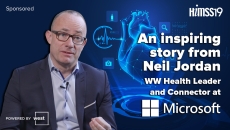Patient Engagement
These providers have created diverse models of care that incorporate use of patient-centered technologies with measurable outcomes.
Paying employees between $25 and $500 for using a transparency tool can result in modest savings of about 2.1 percent.
Neil Jordan, Worldwide Health Leader and Connector at Microsoft, shares how an AI-powered app for monitoring children at home following complex heart surgery prevented tragedy.
Sound marketing principles dictate differentiating among competitors, and too few hospitals do it.
Just as critical as understanding genomic data is getting insights about a patient's environment and lifestyle, says University of Colorado Assistant Professor Mustafa Ozkaynak.
ResMed's VP of SaaS Strategy Annie McBride discusses how the organizations are partnering to enable clinicians to apply insights that help patients be more compliant.
Dr. Anthony Chang, medical director at CHOC Children's, says artificial intelligence won't replace the empathy doctors can provide to patients but can reduce the time clinicians spend on computers.
Even though there is potential for great use of machine learning, James Weese, system vice president at Aurora Healthcare, says most of the trials he's seen have not been successful.
Why don't patients do what they know is good to stay healthy? The answer often comes down to the social determinants, expert says.
While advancements in healthcare technology are necessary, they can't take away the way of the human element, claims Tammy Kwiatkoski, director of clinical informatics for the HIMSS Office of the CTIO.





